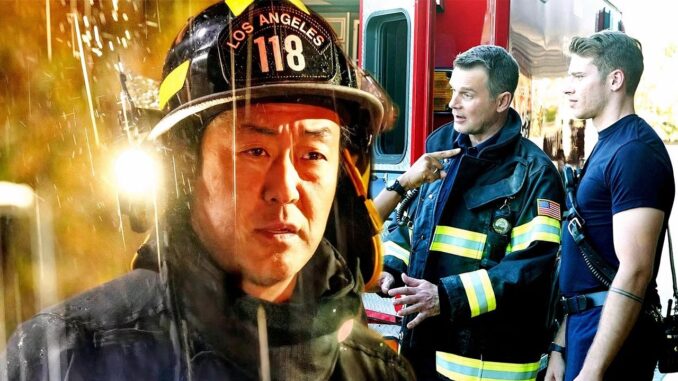
Introduction: The Drama of Filming Locations in Hollywood
When it comes to the glitzy world of Hollywood, filming locations are often just as important as the plot itself. The decision of where to shoot a series can shape its atmosphere, influence its audience, and even become a character in the story. So when news broke that 9-1-1’s new series would not be filmed in Hawai’i, fans were left scratching their heads. Why would a show known for its breathtaking locations choose to film elsewhere? The answer may surprise you.
In this article, we’ll dive deep into the reasons behind this decision, unravel the logistics, and explore the future of filming in Hawai’i for other major productions. Buckle up, because the truth behind why 9-1-1 won’t be filming in Hawai’i is more complex than you might think.
The Rise of Hawai’i as a Filming Hotspot
Before we delve into the reasons 9-1-1 made this surprising decision, let’s take a moment to understand why Hawai’i has been such a popular filming destination in recent years. The islands’ stunning landscapes, tropical climate, and exotic appeal make it a prime location for Hollywood productions. From Lost to Hawaii Five-0, the state has served as the backdrop for countless hit TV shows and movies.
But is this trend fading? Let’s find out.
Hawai’i’s Unique Appeal for Filmmakers
Hawai’i is often regarded as a dream location for filmmakers. Its natural beauty, ranging from lush forests to pristine beaches, offers a variety of settings for both action-packed scenes and intimate moments. Additionally, the state’s distinct culture and vibrant communities provide rich opportunities for storytelling. So, what could possibly drive a production like 9-1-1 to look elsewhere?
The Cost Factor: Why Filming in Hawai’i Can Be Expensive
One of the main reasons why many productions hesitate to film in Hawai’i is the cost. While the islands offer stunning visuals, they also come with a hefty price tag. Filming in Hawai’i requires significant logistical coordination, including transportation, permits, and local labor. Moreover, the cost of accommodations, set construction, and other expenses can quickly escalate.
As a result, many productions have started looking for more budget-friendly alternatives, and 9-1-1’s new series is no exception. The reality is that filming in Hawai’i can stretch a budget thin, especially for a series with the scope and scale of 9-1-1.
The Shift Toward More Affordable Locations
In recent years, other locations have started to rise in popularity as filming destinations. Cities like Atlanta, Georgia, and Vancouver, Canada, offer competitive tax incentives and a lower cost of living, making them attractive options for production companies. These areas provide similar scenic landscapes, making them viable alternatives to Hawai’i.
The decision to film 9-1-1’s new series outside of Hawai’i may be driven by these economic considerations, as production companies increasingly look for cost-effective solutions without sacrificing quality.

Tax Incentives: A Key Factor in Filming Location Decisions
Another crucial factor in the decision to film in Hawai’i or elsewhere is the availability of tax incentives. Many states and countries offer generous tax breaks to filmmakers in order to attract big-budget productions. Hawai’i, however, has been slow to provide the same level of incentives that other locations offer.
For example, Georgia has become a hotspot for film and television production due to its favorable tax credits. This makes it an appealing choice for shows like 9-1-1, which rely on cost-effective production strategies. Without the same level of financial incentives, Hawai’i can’t compete with these other locations, which can make a huge difference in the final decision.
Scheduling and Logistical Challenges of Filming in Hawai’i
Filming in Hawai’i also presents unique scheduling and logistical challenges. The islands are geographically isolated, which can make it difficult to coordinate the arrival of cast and crew, especially for a large-scale production. In addition, the local infrastructure, while beautiful, is not always equipped to handle the demands of a major TV series.
For a show like 9-1-1, which involves complex action sequences and multiple locations, the logistical hurdles of shooting in Hawai’i can be overwhelming. The added time and effort required to transport equipment, manage schedules, and maintain continuity across multiple locations can become a significant burden.
The Impact of COVID-19 on Filming Locations
The COVID-19 pandemic had a profound impact on the film and television industry, forcing many productions to rethink their filming strategies. Travel restrictions, quarantine measures, and health protocols made filming in far-flung locations like Hawai’i more complicated than ever before.
Many productions shifted to locations closer to home to minimize the risk of exposure and reduce travel-related expenses. While Hawai’i has since reopened, the pandemic’s long-lasting effects on the industry have likely played a role in the decision to film 9-1-1’s new series elsewhere.
What Does This Mean for Hawai’i’s Film Industry?
While the decision to skip Hawai’i for 9-1-1’s new series may seem like a setback, it doesn’t mean that the state’s film industry is in trouble. Hawai’i remains a popular destination for film and television projects, especially those with a focus on adventure, nature, and culture. The state has also been investing in its film infrastructure, with new soundstages and production facilities being built to attract more business.
However, as long as other locations continue to offer more competitive tax incentives and lower production costs, Hawai’i may find it increasingly difficult to maintain its status as a top filming destination.
The Future of Filming in Hawai’i: Can It Compete?
Hawai’i’s future as a filming location will depend on several factors. Will the state be able to offer more attractive incentives to filmmakers? Will it invest in infrastructure to accommodate large-scale productions? Only time will tell. However, one thing is clear: Hawai’i’s natural beauty and cultural significance will continue to make it a sought-after destination for certain types of projects.
Why Should Filmmakers Care About Location?
Filmmakers know that choosing the right location is about more than just visuals. It’s about telling a story authentically, capturing the essence of the setting, and making logistical sense. Filming in Hawai’i may be ideal for some shows, but for others, the cost, challenges, and competition from other locations can make it less viable.
The Role of Technology in Location Choices
Advances in technology, such as green screens and CGI, have also changed the way productions approach filming locations. With the ability to create stunning visual effects in post-production, filmmakers are no longer as reliant on real-world locations to tell their stories. This opens up new possibilities for filming in more affordable or accessible areas.
Conclusion: The Complex Reality of Filming Locations
Choosing a filming location is a complex decision that involves weighing a variety of factors, from cost to logistics to tax incentives. While Hawai’i has long been a favorite for filmmakers, the realities of modern production make it less appealing for some shows, like 9-1-1. However, this doesn’t mean that the islands will lose their place in Hollywood’s heart. As the industry continues to evolve, Hawai’i may find new ways to compete and remain a vital part of the film and television landscape.
FAQs
1. Why is Hawai’i no longer a popular filming location for TV shows like 9-1-1?
Hawai’i has become less appealing due to high production costs, lack of tax incentives, and logistical challenges. Other locations offer more affordable alternatives.
2. What are the benefits of filming in Hawai’i?
Hawai’i offers stunning natural beauty, diverse landscapes, and a unique cultural backdrop, making it ideal for certain types of productions.
3. Could Hawai’i lose its status as a filming location altogether?
While it may face challenges, Hawai’i will likely remain a popular filming destination for specific projects, especially those focused on adventure and nature.
4. How do tax incentives impact filming location decisions?
Tax incentives play a major role in where productions choose to film. Locations offering competitive incentives can attract more business, which is why states like Georgia are becoming increasingly popular.
5. Will 9-1-1’s new series ever film in Hawai’i in the future?
While it’s unlikely in the immediate future due to the reasons outlined above, it’s always possible that future seasons or spin-offs could return to Hawai’i if the circumstances change.